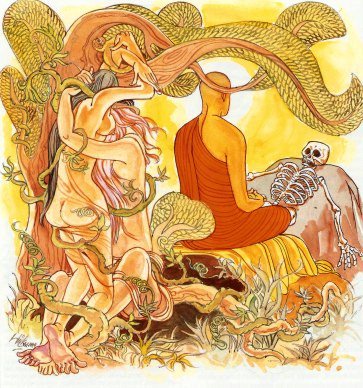Though one should live a hundred years
not seeing rise and fall,
yet better is life for a single day
seeing rise and fall.
Explanation: A single day’s life of a person who perceives the arising and disappearance of things experienced is nobler and greater than the hundred-year life-span of a person who does not perceive the process of the rising and disappearance of things.
The Story of Nun Patacara (Verse 113)
While residing at the Jetavana Monastery, the Buddha spoke this verse, with reference to Patacara.
Patacara was the daughter of a rich man from Savatthi. She was very beautiful and was guarded very strictly by her parents. But one day, she eloped with a young male attendant of the family and went to live in a village, as a poor man’s wife. In due course she became pregnant and as the time for confinement drew near, she asked permission from her husband to return to her parents in Savatthi, but her husband discouraged her. So, one day, while her husband was away, she set out for the home of her parents. He followed her and caught up with her on the way and pleaded with her to return with him; but she refused. It so happened that as her time was drawing so near, she had to give birth to a son in one of the bushes. After the birth of her son she returned home with her husband.
Then, she was again with child and as the time for confinement drew near, taking her son with her, she again set out for the home of her parents in Savatthi. Her husband followed her and caught up with her on the way; but her time for delivery was coming on very fast and it was also raining hard. The husband looked for a suitable place for confinement and while he was clearing a little patch of land, he was bitten by a poisonous snake, and died instantaneously. Patacara waited for her husband, and while waiting for his return she gave birth to her second son. In the morning, she searched for her husband, but only found his dead body. Saying to herself that her husband died on account of her, she continued on her way to her parents. Because it had rained incessantly the whole night, the Aciravati River was in spate; so it was not possible for her to cross the river carrying both her sons. Leaving the elder boy on this side of the river, she crossed the stream with her day-old son and left him on the other bank. She then came back for the elder boy. While she was still in the middle of the river, a large hawk hovered over the younger child taking it for a piece of meat. She shouted to frighten away the bird, but it was all in vain; the child was carried away by the hawk. Meanwhile, the elder boy heard his mother shouting from the middle of the stream and thought she was calling out to him to come to her. So he entered the stream to go to his mother, and was carried away by the strong current. Thus Patacara lost her two sons as well as her husband. So she wept and lamented loudly, “A son is carried away by a hawk, another son is carried away by the current, my husband is also dead, bitten by a poisonous snake!” Then, she saw a man from Savatthi and she tearfully asked after her parents. The man replied that due to a violent storm in Savatthi the previous night, the house of her parents had fallen down and that both her parents, together with her three brothers, had died, and had been cremated on one funeral pyre. On hearing this tragic news, Patacara went stark mad. She did not even notice that her clothes had fallen off from her and that she was half-naked. She went about the streets, shouting out, “Woe is me!”
While the Buddha was giving a discourse at the Jeta-vana Monastery, he saw Patacara at a distance; so he willed that she should come to the congregation. The crowd seeing her coming tried to stop her, saying “Don’t let the mad woman come in.” But the Buddha told them not to prevent her coming in. When Patacara was close enough to hear him, he told her to be careful and to keep calm. Then, she realized that she did not have her skirt on and shamefacedly sat down. Someone gave her a piece of cloth and she wrapped herself up in it. She then told the Buddha how she had lost her sons, her husband, her brothers and her parents. She later became a nun and attained liberation.

